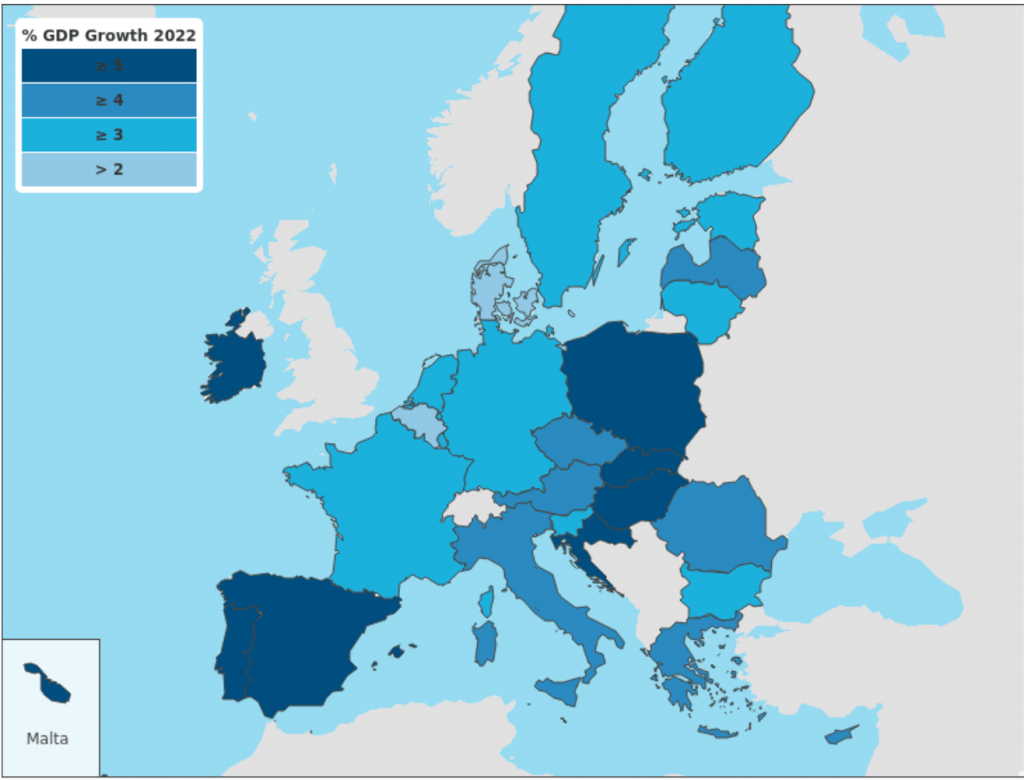The European Commission's predictions for 2022 show Belgium will be the country with the lowest economic growth in the European Union, while the inflation rate will be higher than the bloc's average.
Economists forecast Belgium's gross domestic product (GDP) to grow by about 2.7% in 2022, down from 6.1% in 2021 (when it bounced back from -5.7%) and lower than the average across the continent (4%), according to the European Commission Winter 2022 Economic Forecast.
Meanwhile, the inflation rate in Belgium this year will be higher than the European average: 4.3% in Belgium, compared to an average of 3.5% for the eurozone.
GDP measures the monetary value of all goods and services produced and bought inside a nation or region during a specified time, such as a quarter or year. Generally speaking, economists tend to consider GDP growth of between 2.5% and 3.5% a sign of a healthy economy. However, inflation can occur if GDP grows too fast, making virtually everything more expensive.
The situation in the country is expected to improve in the latter quarters of this year. "At the beginning of 2022, restrictions on activity and supply-side constraints are still affecting the economy but are expected to gradually ease."
Effect of geopolitical tensions
European economies have struggled as the pandemic continues to present problems to supply chains and wider society.
“Multiple headwinds have chilled Europe's economy this winter: the swift spread of Omicron, a further rise in inflation driven by soaring energy prices and persistent supply-chain disruptions," said a statement from Paolo Gentiloni, the Commissioner for Economy.
Related News
- Massive energy bill? You could be entitled to help
- Belgian inflation rate soars to highest level in a generation
"With these headwinds expected to fade progressively, we project growth to pick up speed again already this spring."
Mirroring Belgium's forecast, the EU economy will continue growing during the second half of 2022 and into 2023, but at rates closer to historical norms. The EU can expect a GDP growth of 4% in 2022 and 2.8% in 2023.
By the end of this year, all countries will have reached the pre-pandemic level. But many uncertainties remain. In particular, inflation is a risk factor. "However, uncertainty and risks remain high," Gentiloni stressed, referring to the geopolitical tensions in Eastern Europe which could reduce growth and increase inflation.
Global outlook
Globally, the World Bank expects GDP in advanced economies to grow by 3.8% in 2022 before settling down to an annual rate of 2.3% in 2023. In emerging or developing economies, the World Bank predicts GDP growth of 4.6% in 2022 and 4.4% in 2023.
As is the case in Europe, the World Bank also cites inflation as the primary force holding back economic growth. As a result, many developing and emerging nations are scaling back plans to help their residents and businesses deal with inflation.
In Belgium, where high energy prices are pushing inflation, the European Commission forecast predicts prices will drop during the year. The forecast cites the Belgian Government's recently announced plan to help subsidise high energy costs as helping tamp down inflation.

